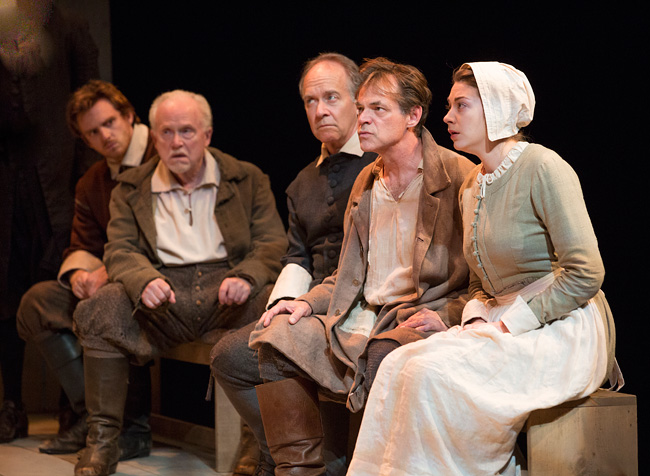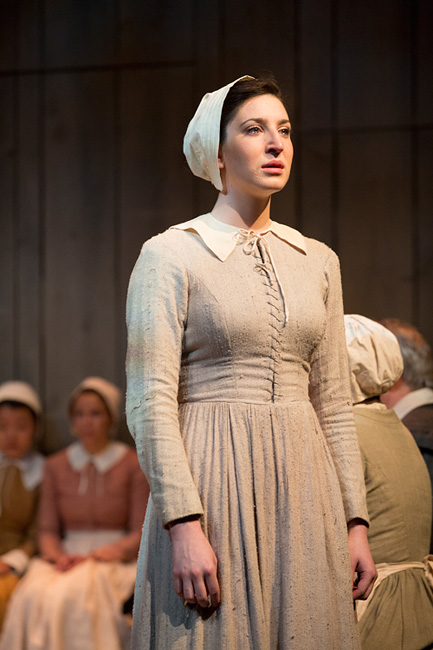Mikaela Davies & Hailey Gillis – Thoughts on The Crucible
Last night, sitting in the greenroom, drinking this special tea we’re convinced brings our voices back to health, we posed the question out loud to anyone who would listen: What should we write about in our blog post?

Frank Cox-O’Connell, William Webster, John Jarvis, Stuart Hughes & Mikaela Davies. Photo: Cylla von Tiedemann
Oliver Dennis suggested we write about what it’s like to be an actor in a remount.
Mikaela: In my experience, the most prominent thing about being a new actor in this remount of The Crucible was that at the start of rehearsals the rest of the cast was already miles ahead of me. The returning actors have had the story in their bodies longer, they have an in-depth understanding of their journey in the play, the kind you can only get from running the show again and again. And this is a wonderful thing. To come into those first days of rehearsal and be able to develop my early stages of Mary Warren against Stuart Hughes’ living and breathing John Proctor, to fumble through my first pass of the court scene with Joe Ziegler’s striking Danforth staring me down, it has been an experience to remember. I feel I’ve been playing catch up from day one – but that is a seriously good game to play when you have the likes of this cast on the stage. There are 11 new cast members in this production. In two and a half weeks we have entered the world Albert and the previous cast have created. We’ve been invited to shake it up, fill it in and push and pull our way into our new version of the story.
Hailey: Being a new actor in this remount of The Crucible has been like taking a giant “trust fall”. It is that inevitable activity you do in your first year of theatre school, or at the beginning of a long day of team building at work. The “trust fall” is an exercise in which you cross your arms over your chest, close your eyes, and fall back into the arms of a partner. They have to both determine how far you will fall and have the strength to catch you in the first place. I have a complicated relationship with this seemingly simple “task”. Needless to say, I have always been caught and, much like my experience with this play, I usually walk away wondering why I was so tentative in the first place. The original cast, crew and director of Soulpepper’s The Crucible had their eyes opened to this play over two years ago.Their breadth of knowledge about the characters and their circumstances are vast. Rather than the safety of a timid tip-toe, the only way into this complex world was to cross my arms, close my eyes, and fall. Then, through the exhilarating ups and the excruciating downs of Arthur Miller’s Abigail, this team caught me. And I think we all walked away stronger than ever.
Nancy Palk mentioned a blog by actor John Lithgow, who is playing King Lear in New York, that tracked the everyday stuff actors go through. She said “I think audiences would be interested to know how you actually feel transitioning from rehearsal hall to stage…”
Hailey: The everyday “stuff” for me are the small steal-away moments during rehearsal time: It is when I’m cleaning my bathroom at four in the morning, because I can’t sleep, listening to an audio book about Salem and the voice speaks a line from Paradise Lost and, for some reason this one line changes how I see the whole town. Or when I steal away from some scene work to buy myself a chocolate bar at SOMA and as soon as I bite into it I know that I’m ready to take on the rest of the day. It was the moment when our cast stepped onto the raked stage of Lorenzo Savoini’s beautiful set for the first time. In that moment I felt like wherever I was I was being propelled into the audience, which made me very aware of being seen. It’s half thrilling and half terrifying up there; much like the journey of my character in the play. After a few hours of making this transition I was able to sit in the back of the theatre and watch my fellow cast mates perform act two of the play. Seeing them and observing how they existed in the space made me conscious of how important this play is. It was a small steal-away moment that caused me to feel immensely grateful.
Mikaela: It’s our first day on stage and I feel like a crazy person. I’m convinced all my good acting was left in the rehearsal hall. We have some incredible rehearsal halls at Soulpepper: brick walls, high ceilings and wooden slats that cover two skylights. I could curl up on the floor backstage and pretend I was really in Salem, looking up at the moon shining through the cracks in the roof. (Note to Equity: It was not actually the moon but the sun, there have been no overnight rehearsals.) Now that we’ve transitioned from the hall to the theatre I don’t know where to wait for my cue before I enter on stage. There are no skylights backstage with wooden slats – just carpeted floors, dark ceilings and actors gathered round a water dispenser. I’m sure I’m driving stage management insane with my constant repositioning. Lying in the middle of the floor, curled up in a ball behind the curtains, pacing back and forth, none of it seems to fit. I know that I’ll find a new ritual and a new place (perhaps a simple chair would suffice?) but it is striking to me how much the energy of a space can affect us.
*Three days later I can now say I wouldn’t go back to the rehearsal hall if you paid me. All I want to do is perform on Lorenzo’s beautiful set under the dark and sculpted lighting design of Steven Hawkins. The wooden planks, the raked stage that catapults you into the audience, the flicker of candles in the dark, all of it creates a vivid world to walk into. Also, I have found my perfect place to wait before I enter on stage, between the walls of the Tartuffe set.
Albert Schultz said we have to write about everything we learned…
Hailey: Albert Schultz is a master builder. The way he can zoom in and zoom out of a theatrical image to build specificity into a complex world is truly amazing. What I have come to learn throughout these rehearsals is that: at the centre of this talent is his commitment to the character and actor’s journey. Together Albert and I have tried to find an Abigail that it a lover, fighter, and ultimately a survivor. Albert has safely and expertly guided me to places where I can understand in myself what it means to experience determination from a place of loss. “God is in the details” Albert often says, now I fully understand and believe in that truth.
Mikaela: Ah yes, the master builder. Albert has the ability to use every single body in the space to tell a story and at the same time to zero-in on the smallest detail to frame a moment. A breath, a look, a hidden smile, these are all subtle things you will notice in our production because he put them there and meant for you to catch them. The biggest thing I’ve learned in this process is to trust the director. There is this fantastic line in the play said by Ann Putnam, played by Raquel Duffy, “there are wheels within wheels in this village and fires within fires.” There are wheels within wheels in our production and fires within fires. There are inner workings telling bigger stories that I can’t see. This has been a hard lesson for me to learn because I want to know and see everything ALL THE TIME. There are moments in our play that, isolated, I may not understand but my specific movement is part of a bigger picture that the audience will receive. The other day, while directing a scene, Albert said to us, “I wish you could see what I see, but you can’t, so you’ll just have to trust me. It’s really good.” Now it is the afternoon of our opening night, Albert called us all for one last rehearsal run. He ended his final notes session with the words, “this run is for you guys now.” The trust has come full circle: he’s put the show in our hands.
